- Home
- Sebastian Faulks
A Week in December Page 14
A Week in December Read online
Page 14
‘Aye.’
Hassan stood up and found his right hand warmly clasped.
‘My name is Salim. No need for this pseudonym nonsense any more.’
Hassan found himself shaking hands with a man of about thirty, taller than he was, of African parentage, Ethiopian maybe, with a candid, friendly expression and a London accent. He put his arm briefly round Hassan’s shoulder. He had an earring in his left lobe.
‘There’s a juice bar not far from here. We could go and have a chat there if you like.’
‘All right.’ Hassan was aware of how guarded he must seem and regretted not being able to respond more openly to Salim’s friendly manner, but the way they’d met had after all been pretty strange: from the hypothetical reality of pseudonymous e-mail to the warmth of human touch.
In Grafton Way, Salim led him into a juice bar/café with lightweight metal chairs and circular tables. It was the kind of place Hassan liked – modern, teetotal and one of a dwindling number not owned by Café Bravo, Folger’s or some other US monster with sour, expensive coffee, glutinous muffins and a long queue.
He ordered mango juice and noticed Salim did the same.
‘I saw your thing on YourPlace,’ said Salim. ‘I use this, like, powerful search engine that picks up a lot of keywords. Then, when I read what you’d written I couldn’t stop laughing.’
‘I know it was a wee bit teenage, it’s just—’
‘No, no, I didn’t mean that. I laughed because it was so right. Me and you were meant to meet.’
‘We were?’ Hassan felt himself smile a little, despite his caution. Burly Salim reminded him of Baloo the Bear in the Jungle Book cartoon.
‘We were.’ Salim smiled. ‘I run a discussion group at a mosque not far from where you live. Near Pudding Mill Lane. We meet after prayers once a week and we discuss our faith and our lives, how we can bring the two together. A lot of traditional Muslims, I think they pay lip-service if you know what I mean, and when they’ve said their prayers they think that’s it. But we share our thoughts on how the Koran’s a programme for all you do. Islam’s for life.’
‘Not just for Christmas,’ said Hassan.
‘What?’
‘Silly joke. Like a dog. It was an RSPCA advert. “A dog is for life, not just for—”’
‘Do you make a lot of jokes about religion?’
‘No, no. Not at all,’ said Hassan quickly. Shit.
‘Are you from Scotland?’
‘Yes,’ said Hassan. ‘Is that relevant?’
‘No. Not to our purposes.’ Salim smiled again.
‘Good.’
‘Well, do you think you’d like to come along and try it? You obviously know the scriptures and you’re looking for something more meaningful in your life.’
Hassan thought. It was a little disappointing, just to be called back to the old faith. But in another way, he felt it was time. There was something attractive about going home, returning to the fundamental things, when politics alone had let him down. ‘Jock’. God.
‘All right,’ he said. ‘On condition I don’t have to give any speeches or public declarations.’
‘Sure,’ said Salim. ‘We’re perhaps a bit more fervent than people of your father’s generation. You know. But we’re traditional too. It’s all based on scripture, not on interpretation.’
‘But no public speaking? You promise?’
‘I think you’ll find you want to. But it’s entirely up to you.’
Salim paid the bill and gave Hassan a booklet to read. ‘Our next meeting’s on Wednesday. Will I see you there?’
‘Maybe. Probably.’
III
Gabriel Northwood was staring through the window of his barrister’s chambers at the warm drizzle that was starting to fall on Essex Court. He had finished the Tuesday ‘Brutal’ Sudoku and had fallen back on the ‘Testing’. He tossed the puzzles into the wastepaper basket and picked up a copy of the novel he was reading, one of Balzac’s slower ones, which he’d borrowed from the library since he no longer had enough money to buy books. The pace didn’t bother him. He didn’t care for too much narrative in novels, and he liked the solidity of the Master’s specification: the stone flags, lead and verdigris; the inky writs and rent books. He held it in his left hand, and, with his feet up on the desk, he used his right to click the mouse over the e-mail icon and watched the inbox unfurl from the dock.
There were two new messages. His accountant. Subject: Your VAT return. Then, [email protected]. Subject: Dec 22: pour-mémoire.
He had forgotten he was meant to go to dinner with them. Perhaps he had meant to forget. In the human mind, the French psychologist Pierre Janet had claimed, nothing ever gets lost; it was merely a question of whether the route to finding it was blocked by other traffic or by a hidden desire to forget – as Janet’s one-time colleague Sigmund Freud maintained; for in our thought processes, the old Moravian dream-reader had believed, nothing is ever accidental.
By this reasoning, Gabriel was a contributor to his own failure. His lack of work couldn’t be ascribed only to chance or to the judgements of solicitors who didn’t brief him – or even to his own performances in court; there must on his part have been at least an element of volition.
Perhaps, thought Gabriel. He didn’t remember how he’d met the Toppings in the first place – probably through Andy Warshaw, his friend in Lincoln’s Inn; then all it had needed was one attendance at their house, reasonable manners, and he was for ever listed as a solitary man who could be summoned to sit between female strangers.
Yet the thought of dinner was attractive to Gabriel. The food at lunchtime in the dining hall was no longer the bargain it had once seemed; he disliked sitting on long benches with other barristers and he disapproved of the way they called the dining hall ‘Domus’, to rhyme with ‘comb-us’, as though they could rewrite Ovid’s scansion in their own dog-Latin. The Toppings would doubtless have caterers who’d be obliged to provide a minimum of three courses. Most of the other guests would probably spend the evening trying not to eat, pushing the food round the plate while offering insincere compliments. Someone had to put the stuff in his mouth, and Gabriel was thin enough to eat three dinners single-handed; a week before, he had bought some braces (from the Oxfam shop, he couldn’t help noting) to keep up the trousers of his suit.
Samson put his head round the door. ‘Tea in Mr Hutton’s room, Mr Northwood.’
‘Thank you,’ said Gabriel.
The Thames was just visible from the window of Eustace Hutton, QC’s room, where members of the chambers stood among the boxes of documents and the towers of lever-arch files from which curled yellow gummed-paper markers. When Hutton walked over to the Royal Courts of Justice, the clerks preceded him with railway porters’ trolleys on which they wheeled the weight of papers his Appeal Court appearances necessitated. ‘If I might request your lordships to start the day with a little housekeeping,’ Hutton invariably began, speaking from within his piled redoubt of cardboard boxes, while identifying for the judges the system by which he would refer to documents he wanted them to see. Equally invariably, their lordships, however scintillating on matters of jurisprudence, grumbled about the paperchase. ‘Box four, file two, appendix three, page forty-four, paragraph seven ... Is this not something of a record – even for you, Mr Hutton?’
Gabriel rested his teacup on a ziggurat of his head of chambers’ upcoming briefs and looked out of the window, down towards the river. Swollen with December rain, it was gliding on beneath the lights of the Embankment, under Blackfriars Bridge, above the embedded railway underpass, below Southwark Bridge and over the buried Cannon Street commuter lines – under, over, under, like a liquid weave, thought Gabriel, as it made its way through the old slums of Limehouse and Wapping, where watermen with lanterns in the bow had once pulled bodies from the water, and on towards the sea – or at least to the tidal barrier at Woolwich against which the swollen oceans were rising.
After tea, back in his ro
om, Gabriel took off his jacket and loosened his tie. He put his feet on the desk and picked up the crossword. ‘Butcher has ox tongue’. It was the last clue, and if ‘boxcar’ going down was right, which he was sure it was, it began with an ‘x’. And since there was also an ‘x’ in the clue, this suggested an anagram. He looked away, out of the window, then looked back, and, as though by itself, the word formed in his mind. ‘Xhosa’. The African language, or ‘tongue’. ‘Butcher’ was not the man it had seemed, but a verb – a command to cut up ‘has ox’. Purists preferred that anagram indicators be verbs, and an imperative was even better. Every word worked its passage, yet the surface meaning was fluent, unimpeachable; it passed the ultimate test – that it could be read not as a cryptic clue but as a normal statement.
He wasn’t quite sure which part of Africa the Xhosa tribe inhabited. Was Nelson Mandela perhaps a Xhosa? Well, he wasn’t a Zulu, he was fairly sure of that. Zulus no longer made him think of Michael Caine at Rorke’s Drift, but of Saul Bellow, who, when defending the teaching of dead white male writers to university students during some multicultural debate, had declared himself open to authors from other countries, and happy to teach them, but unsure about who they were. ‘Who is the Proust of the Zulus?’ he had asked. ‘I should like to read him.’
Gabriel typed the words ‘Bellow’ and ‘Zulus’ into his search engine. It turned out that the actual quotation was ‘Who is the Tolstoy of the Zulus? The Proust of the Papuans? I’d be glad to read him.’
Bellow, as a Canadian-Russian Jewish immigrant to Chicago, could say things like that because he was himself the human outcome of persecution and upheaval. This gave him an advantage and an immunity. When he revealed a new character to be the dean of an arts faculty it was as good as saying that the tragedy of the century would run through his veins; he was Everyman as much as Bellow’s creature, and the stresses and desires of his campus life in the broad-shouldered city would have a global relevance that could be sensed equally in Minsk and Tokyo. Philip Roth likewise, Gabriel thought: the more fiercely he focussed on the making of gloves or luggage in Newark and the minutiae of sexual desire, prostate surgery or coming death, the broader, paradoxically, seemed the resonance. For German-Protestant Updike it had been harder, since he was by birth aligned with a majority; but something about his detailed love of America, itself so diverse that it was barely an entity, had periodically at least allowed him to present his characters as representatives of something that reached beyond their native Shillington, PA. Culturally, it had remained impossible for a realistic British novelist to transcend Leicester or Stoke; the place names alone seemed to laugh at the idea.
Gabriel found his thoughts turning to Jenni Fortune, another result of human migration. What a frightened little whippet she had seemed when first she came in for a conference. He guessed that the panoply of law, the threat of Latin and long words alarmed her. Yet she drove a train. People entrusted their lives to her. As the months went by, he’d come to see that it wasn’t intelligence she lacked and it wasn’t character; it was confidence. He supposed her education in the local state school hadn’t done much to supply the missing quality. He could tell from the way her eyes were always straying to his bookshelves that she was a reader, but when he’d first tried to draw her on the subject of her favourite authors, she clammed up.
What was this thing with women and confidence? he wondered, not for the first time. Catalina had had more of it than Jenni, though even she at some deeper level found it difficult to believe in her own value. Imagine Eustace Hutton ever doubting himself. Even Terry the junior clerk thought the world should move across and make room for him.
In Old Pye Street, meanwhile, it was a lethally quiet morning. John Veals spoke to no one. Those who knew him well – Stephen Godley, in other words – recognised that this meant a trade was being put on. The words that stayed furthest from Veals’s closed lips were ‘Allied Royal Bank’; even to put the name into the air was to chance it being inadvertently repeated outside the office before Kieran Duffy could get to work.
Veals was confident that Duffy could take the positions in gilts and sterling without arousing too much suspicion, but as he sat at his desk with the door locked, trying to think how else he could exploit the collapse of Allied Royal, he did what he sometimes did at moments of quiet introspection: he looked to Olya for inspiration.
John Veals’s desk had a small rectangular table set at right angles to one side. On this he kept a laptop, whose screen was a modest 15.6 inches; it was a negligible affair when compared to the four flat-screen terminals with their jagged graphs and instant price movements that lowered over his main desk on a chrome gantry. On the laptop, however, he would flip though various websites – the BBC news, a horse-racing site and, more and more often, a soft-porn place he had recently discovered. It was called babesdelight.co.uk and featured naked young women who were mostly, to judge by their names and cheekbones, of Slavic origin. Having read of the proportion of Internet traffic devoted to porn, Veals had vaguely wondered if there might be money in it. He was unembarrassed by sex, as by anything else, and didn’t bother to turn off the pictures if someone came in. The girls were clearly over age and weren’t engaged in anything more than showing their bodies to a camera; there was nothing here that was not on knee-high offer from the country’s favourite family high-street stationer.
The girls at babsesdelight were laid out like an exotic stamp collection, twenty to a page. If you clicked on one, it offered you a series of a dozen poses, many on a beach or by a waterfall, some in the jagged mountains of what might have been Slovenia. Occasionally when you clicked, the first image didn’t lead to the next page of the album but prompted something cruder, which Veals snapped shut. Usually, however, it was just naked girls in bedrooms, naked girls on farms or naked girls on a hike.
There was one in particular who had taken his eye. She was called, allegedly, Olya and claimed to be keen on tennis and cooking. She was slim, as were almost all the girls at babesdelight, but she had large breasts which she held coquettishly in her hands as she grinned out from her Transylvanian background. Her hair was black, her eyes brown and, unlike the majority of the girls, she had not undergone total depilation. She reminded Veals of a real girl, not a pin-up; he could imagine himself talking to her, as well as stroking her rear when she knelt on all fours and glanced back over her shoulder.
Olya awoke in him a feeling other than lust. He couldn’t put a name to it and didn’t try; it was a soft and unfamiliar sensation. He just liked looking at her, almost every day. He felt a fraction guilty if he left it more than a week.
Hello, Olya, he almost said. Hello, John, she almost replied.
Veals suddenly sat up straight in his chair. He had had an idea. Olya had cleared his mind.
Thanks to its empire roots, Allied Royal still had strong connections in Africa, where the commodities export markets had long relied on its finance. If ARB suddenly found itself short of money it would look for quick savings. It couldn’t hammer its pensioners or its UK mortgage holders because that would cause a riot; but who would care about a few Third World farmers? If ARB decided to suspend its credit lines to distributors, exporters and shippers, then the producers of cocoa, coffee and so on would find the value of their crops plunge – they would wither in the field; but by contrast the price of what they had presold, of what was already in the warehouse, would rocket – and the profit from that could go to John Veals. He could get Duffy to take long positions in warehouse receipts for all the commodities financed by ARB.
He had suddenly remembered what fun trading could be.
There was a knock on the door and Veals went over to unlock it. Young Simon Wetherby was standing outside.
‘I was just going through some papers, John, and I had a couple of queries. Is this a bad moment?’
‘No. It’s a good one. Quiet day.’
‘Yes. So I’d noticed.’
‘Come in and take a seat.’
; Veals followed Wetherby’s eyes to the laptop computer, where Olya was in close-up. ‘Charming girl, isn’t she?’ said Veals.
‘Yes. Pretty.’ Wetherby sat down and looked across at Veals, his innocent face shining with concentration. ‘It’s about our activity in the American sub-prime market last year.’
‘What about it?’
‘There’s just something I didn’t understand. All these credit default swaps. The insurance things. How did that work?’
‘Aah ...’ Veals put his feet up on the table. ‘That was fun. That finally opened the door. Do you want to hear a little story?’
‘That’s what I was hoping for.’
‘It’s a little bit tough. You may want to take a deep breath at this point. Gather your forces. It won’t take long, though.’
‘I’m sure I shall be equal to the task, John.’
‘OK. Here goes. You know we screwed up on sub-prime. I could see it was a disaster waiting to happen but we just couldn’t make it work for us.’
‘Yes. I saw the positions we liquidated.’
‘OK. Bézamain calls me from New York. This is some time in April. He’s had a weird visit from this banker.’
‘Why’s it weird?’ said Wetherby.
‘He’s offering us a way of us shorting his own market.’
‘What? I’ve never heard of that before.’
‘Me neither,’ said Veals. ‘So I got on the plane to New York and met this guy, Johnny from Moregain or Goldbag, I forget which. We knew the sub-prime market was rotten but it was too expensive to short the stock of the mortgage lenders and the builders and so on. And anyway the market was still holding up. But Johnny says: Look, forget the stock, you can short the actual mortgage bonds – the ones that are backed by the sub-prime loans.’
‘You can short the actual security?’
‘Yes.’
‘The useless ones?’ said Wetherby. He looked a little shaken, Veals thought.

 Devil May Care
Devil May Care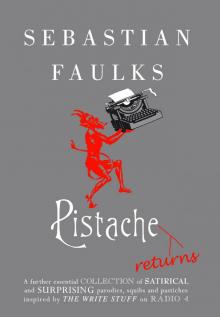 Pistache Returns
Pistache Returns The Girl at the Lion D'Or
The Girl at the Lion D'Or Pistache
Pistache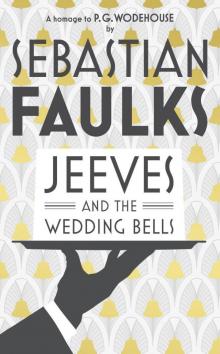 Jeeves and the Wedding Bells
Jeeves and the Wedding Bells A Week in December
A Week in December The Vintage Book of War Stories
The Vintage Book of War Stories Engleby
Engleby Birdsong
Birdsong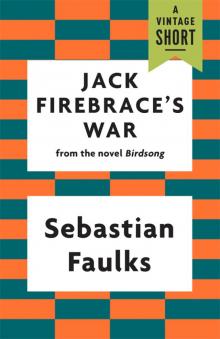 Jack Firebrace's War
Jack Firebrace's War Where My Heart Used to Beat
Where My Heart Used to Beat A Possible Life
A Possible Life The Fatal Englishman: Three Short Lives
The Fatal Englishman: Three Short Lives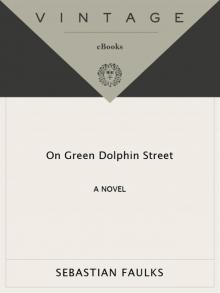 On Green Dolphin Street
On Green Dolphin Street Charlotte Gray
Charlotte Gray A Broken World: Letters, Diaries and Memories of the Great War
A Broken World: Letters, Diaries and Memories of the Great War Human Traces
Human Traces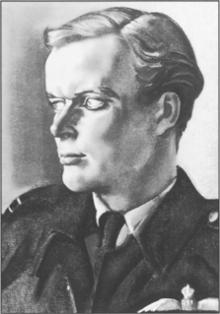 The Fatal Englishman
The Fatal Englishman A Broken World
A Broken World Paris Echo
Paris Echo War Stories
War Stories Girl At the Lion d'Or
Girl At the Lion d'Or